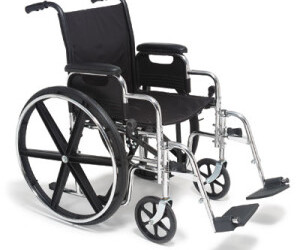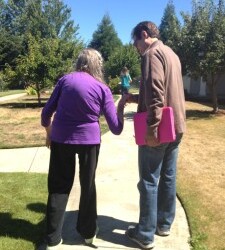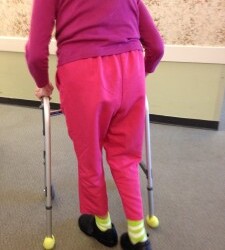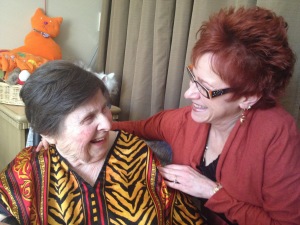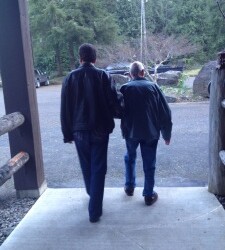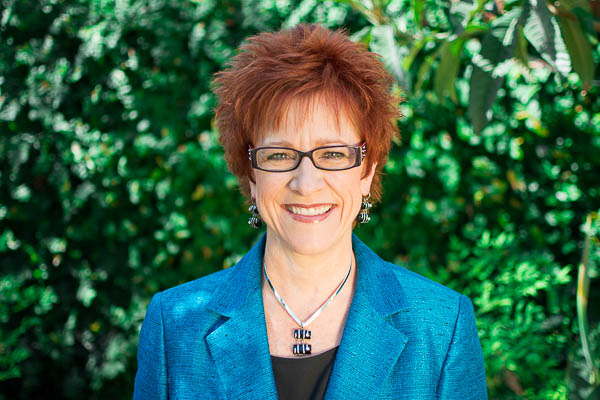by Diane Masson | Sep 27, 2015
Almost everyone wears a mask out in public. It can be exhausting to hide behind a fake exterior and pretend we have it all together. I meet seniors and sales people everyday that seemed poised and polished to the world and yet they are terrified inside. Many seniors and sales people have lost the ability to be real and authentic. They have worked hard to create the illusion that everything is fine, because they fear showing their vulnerability. Seniors walk into retirement communities everyday announcing that he or she is fine and “not ready yet” to make a move to senior housing. If you could pull off the mask, you might see a frightened senior who knows their memory is slipping, had a recent fender bender in the car or is just extremely lonely. That’s why they are exploring senior housing options. Is this you? Sale people may be dealing with an angry teenage daughter, a new baby, or ailing parents. They have to leave their breaking heart in the car and arrive for work with a mask of happiness. Is this you? Here are the three most common masks: The I’m Fine Mask: You smile and say that everything is fine when your heart is breaking. It appears that you have it all, but you may feel lost inside. It is safer to hide, because people expect it. The Performance Mask: You have the “to do” list. You keep up a frantic pace. If you stop performing then you are not worth anything at all. You want to matter and count. The “I don’t care” Mask: You...
by Diane Masson | Sep 20, 2015
If an aging senior has a new health diagnosis or is getting frail, what might happen in his or her future? Many seniors don’t realize that senior living communities often have minimum health requirements. If you have a diagnosis of a progressive disease, you may not qualify for certain types of housing. If you are in the later stages of Alzheimer’s, you may only qualify for memory care or skilled nursing care. It is illegal for a senior housing care provider to let you move in and not be able to provide for your needs. Many seniors are stunned when they arrive at an independent senior living community to be told they have bypassed an independent living setting and that an assisted living community would provide a more appropriate level of care for them. The conversation that a retirement counselor in a senior housing community dreads most is “the talk” with a future resident. As I write this, one Continuing Care Retirement Community (CCRC) that I work with had to turn down two senior applicants in the last six weeks. One applicant had a diagnosis of dementia and could not manage alone, and the other was too frail for independent living. Even though those seniors thought they were fine to move into independent living, they only qualified for assisted living. Other CCRCs I worked with in the past would deny people admittance if they had ever had cancer, Parkinson’s, Alzheimer’s, multiple sclerosis, or anything that would send them quickly into a higher level of care for an extended period of time. How can they do this, you might ask?...
by Diane Masson | Sep 13, 2015
Smart seniors plan ahead and research their options. Don’t get caught in a health care crisis. Once you are in crisis mode, your options may be limited. These seven deadly sins are a summation of my work with thousands of seniors during the course of my career. Do you agree with these 7 deadly sins in the video? Do they apply for home care, assisted living, memory care, skilled nursing and Continuing Care Retirement Communities? Your Senior Housing Options,” has a simplistic title, but what’s inside this new book can save a you months of research time. Hear Diane Masson’s interview of how her mother and in-law’s faced the pivotal decision to plan ahead or wait until a crisis. Learn the pitfalls from transitioning from your home to senior housing. Understand what questions to ask, insider tips and dirty secrets revealed. For weekly tips join at: Www.Tips2Seniors.com Diane Masson has worked in senior housing for 17 years and is the regional marketing director for two debt-free Continuing Care Retirement Communities in Southern CA (Freedom Village in Lake Forest and The Village in Hemet). Her first book “Senior Housing Marketing – How to Increase Your Occupancy and Stay Full,” is being utilized by senior housing professionals across the country. Both her first book and second book, “Your Senior Housing Options,” have a 5-star rating on...
by Diane Masson | Sep 6, 2015
A senior can easily become overly dependent on a caregiver. A helpless 92-year-old senior woman, who is recovering from a surgery, can suddenly become isolated in her own home and becomes reliant on her new around-the-clock caregiver. In memory care communities, seniors with dementia rely on the loving support from their caregivers or fellow residents. Joyful smiles, from a dementia resident, may only be reserved for those who see them daily. Sometimes a wife learns that her husband in memory care has decided to marry his “friend.” The “friend” might be a caregiver 50 years younger or another resident. “Dear Abby,” recently published a letter from a man in his late 60’s. He wanted to marry a 28-year-old woman with three children. His question for “Dear Abby” was should he do it? She suggested a prenuptial agreement. A frail senior man moved into a residential board and care home to recover from a hospitalization. His wife was optimistic about his ability to recover and return home. Her other wish was to have him improve enough to move into a Continuing Care Retirement Community with her. Unfortunately, the caregiver at the board and care home did everything for the husband. The wife begged for them to help her husband recuperate, by letting him dress himself, strengthen his legs by standing up, improve his endurance by walking around the home and etc. Instead the caregivers continued to make him 100% dependent on them, so he grew weaker and wheelchair bound. Now this couple (married for 60 years) will not be able to live together again. Unlicensed home care workers (fly-by-night) can...
by Diane Masson | Aug 30, 2015
Would you build a chicken coop to have a senior move into your retirement community? Are chickens even allowed? What would your senior living community promise in order for a senior to move in? How many cats does your retirement community allow per senior resident? Would you increase it? Are you willing to take on two 100-gallon tanks of fish? One fish tank contains large koi and the other fresh water bala sharks. “I still have my wits about me and don’t want to leave my animals,” said a prospective senior resident. “The administrator has promised me that he will take all my pets and if I pass away, he will let all of my precious chickens live with him at his home. He loves my chickens.” This senior is waiting for a two-bedroom apartment to become available, but she has still not decided to actually move. Her family and friends (I am one of them) have been encouraging her to make a move for two years. She currently lives alone in a two-story home with a caregiver who helps several days a week. Who knows how many years my senior friend has left? I don’t know. What I do know is that my friend would thrive in a retirement community with live music and weekly entertainment. She used to be very active with dozens of friends and now she is isolated in her home with early dementia and a lack of mobility. My senior friend comes to life over a lunch or dinner conversation. I told her that she could have social connectivity everyday if she moved into...
by Diane Masson | Aug 23, 2015
Discover key differences between rental facilities versus Continuing Care Retirement Communities. Do you have enough financial resources if you need to be in a higher level of care for an extended period of time? Always consider your future health care needs today. Who will provide your care and at what cost? Do you want 100% responsibility for your future health care costs or do you want to share the risk with a Continuing Care Retirement Community? Author, Diane Masson, shares her insights from her new book, “Your Senior Housing Options.” Enjoy my TV interview below and for weekly tips join at: Www.Tips2Seniors.com Your Senior Housing Options,” has a simplistic title, but what’s inside this new book can save a you months of research time. Hear Diane Masson’s interview of how her mother and in-law’s faced the pivotal decision to plan ahead or wait until a crisis. Learn the pitfalls from transitioning from your home to senior housing. Understand what questions to ask, insider tips and dirty secrets revealed. For weekly tips join at: Www.Tips2Seniors.com Diane Masson has worked in senior housing for 17 years and is the regional marketing director for two debt-free Continuing Care Retirement Communities in Southern CA (Freedom Village in Lake Forest and The Village in Hemet). Her first book “Senior Housing Marketing – How to Increase Your Occupancy and Stay Full,” is being utilized by senior housing professionals across the country. Both her first book and second book, “Your Senior Housing Options,” have a 5-star rating on...
by Diane Masson | Aug 16, 2015
I asked the same question to four memory care communities that were licensed as assisted living. The responses might surprise you and help you determine where to place your own mom or dad. What happens if my mother-in-law wakes up disoriented at 2:00 AM and gets up to find the bathroom? Then she falls… Memory Care Community A – “When we find her, a med tech would evaluate her. If she hit her head or something major happened, then 911 is called. My husband asked about the med tech training. Is it like an emergency medical technician (EMT) with a minimum of 140 hours of medical training? She said, “No, it is like a CNA (Certified Nursing Assistant). There are specific criteria that they are trained on.” Does someone go with the dementia resident if they go out 911? No! Diane’s opinion: In my experience, no CNA has the medical expertise to make a judgment call on a fall. My mother’s assisted living community always sent my mom out 911 from a fall in the middle of the night. It happened five times. It was highly traumatic for her. When someone arrives at the emergency room with dementia, it is scary and confusing. It would disorient her for days after each traumatic adventure. Memory Care Community B – “We have certain guidelines to know when to call 911. In the past month we have had two seniors go out 911. Eighty percent of the time falls do not require 911. We would call the family to meet the senior at the hospital.” Does someone go with the dementia resident...
by Diane Masson | Aug 9, 2015
My seatmate flying up to Seattle shared that his mom can no longer prepare her own meals. She was diagnosed with Parkinson’s about one year ago. She is currently living in Washington State and can no longer drive. The local family needs to bring her meals to sustain her. Is it fair to rely on your family to keep you at home? The mom refused to move to California to live with one of her sons. He specifically bought a home with a “mother-in-law apartment” for her. But she did not want to leave her home or local friends. Another adult child comes monthly to take her to doctor appointments. My seatmate, her son, visits her about every six months because he lives 1000 miles away. The family is getting together from all over the country to celebrate her milestone birthday. They are going to discuss future care options, because she is not safe living alone. I suggested he read my new book to help him with his dilemma. He learned that the assisted living community under consideration is about $5,000 a month. He didn’t know that transitioning to skilled nursing care at some point could cost the family around $90,000 a year on a national basis. The family figured all the children could chip in to support mom to live in a higher level of care. So they want to check out her possible VA Benefits as the spouse of a deceased Veteran. So I shared with him that for VA Benefits to begin, three keys need to happen: The mom needs to spend down her assets. She...
by Diane Masson | Aug 2, 2015
Last week we had 24 new residents at our new resident reception. Out of 24 new senior residents: Two senior couples had met online. One senior couple had met by each placing an ad in the local paper. Wow! How exciting is that? Seniors are finding love after losing a spouse of 30 or 40 years. One of these couples met through E-harmony. We had dinner together and they shared their exciting journey. They each filled out a lengthy questionnaire to find the perfect mate. Each was looking for someone who loved to travel. The gentleman rejected a potential date with a senior who only loved cruising, another lady only wanted to travel to Europe and a third potential senior woman was a retired stewardess. This senior man was patiently waiting for a senior woman who wanted to travel by RV or motorhome around the country. After finding that potential senior woman online, they only corresponded through the dating website for next three months. Then they exchanged emails and phone numbers. They both proceeded cautiously. Well their relationship bloomed into marriage and traveling the country by RV for four years. You can see a glow on each of their faces when they speak of the other. They decided to settle at The Village in Hemet, CA. They wanted to create a plan for their future and not be a burden to their families in a health care crisis. They are trying every community activity together, such as exercising in the health club, enjoying live performances and swimming three days a week. Both of them love life and are enthusiastic...
by Diane Masson | Jul 26, 2015
Let’s hear from professionals around the world to see if this assumption is correct! Do seniors need fewer days of hospice in assisted living and skilled nursing than at home? It makes sense to me. An article by the Philly Voice stated, “At hospice enrollment, between 2008 and 2012, 78,130 of the patients in the study lived at home and 7,451 were in assisted living.” My own mom with vascular dementia, living in skilled nursing care, only needed 4 days of hospice care. While my mom was actively dying with hospice care, I read about all the signs people show approaching death. In a great little book called, “Gone from my Sight, The Dying Experience,” by Barbara Karnes, RN, I learned how seniors start to withdraw one to three months prior to death. The desire for food decreases while sleep dramatically increases. A senior can become more disoriented, agitated and talk with the unseen one or two weeks before death. As I held my mom’s nonresponsive hand a few days before her death, I realized that most of what the book predicted had happened to my mom in the previous few months. Yet she was completely supported in her skilled nursing environment. What a gift that community gave her. When she could not feed herself (she forgot how because of her dementia), the caregivers or I would feed her. At every meal she was given an opportunity to feed herself. The staff never gave up on her improving. If my mom had been home, I would have fretted and taken her to the doctor to learn why she was...
by Diane Masson | Jul 19, 2015
End of life decisions are so difficult for an advocate to make for his or her’s senior parent. A few months ago, I had to make tough choices for my mom before she passed. A month ago, my husband and his family faced difficult choices for his dad. My father-in-law, Bill, had been on home hospice with 24/7 care for about three months. He was frail (worn out from being a caregiver for his wife who had Alzheimer’s), had inoperable blockages in his heart, had four small strokes that my sister-in-law witnessed and was frustrated with early dementia. He was reaching for the cat when he fell. The hospital determined that his pelvis was fractured in multiple locations and his femur (thigh bone) was broken. So Bill would be bed ridden the rest of his life. Sigh…he was in so much pain. They were turning Bill every two hours to prevent bedsores. He could only be on his back and the side without the broken femur. He was a two-person transfer. The fall that sent him to the hospital was a non-hospice related incident so it was covered by insurance. With no hope of improvement the hospital determined that he was once again comfort care. So according to the hospital, he was a hospice patent who needed to move out of the hospital or pay privately. The only skilled nursing care facility in the area was not an option (bad reputation). There were no hospice facilities in the local area. So the only two choices were: Stay in the hospital for a cost of $48,000 a month. Go home...
by Diane Masson | Jul 12, 2015
Most seniors want to stay in their own home. Learn five keys in this TV interview to differentiate a reputable home care company from a fly-by-night company. Paying a caregiver under the table may end up being your most expensive option. Can you afford 24-hour home care? If not, learn the costs of your other options before you deplete your resources. Learn more insider tips in a new resource book, “Your Senior Housing Options” or get weekly advice for free at WWW.tips2seniors.com. “Your Senior Housing Options,” has a simplistic title, but what’s inside this new book can save you months of research time. Hear Diane Masson’s interview of how her mother and in-law’s faced the pivotal decision to plan ahead or wait until a crisis. Learn the pitfalls from transitioning from your home to senior housing. Understand what questions to ask, insider tips and dirty secrets revealed. The decision to stay home requires caregivers. Prevent elder abuse by determining if a home care agency is reputable, before they move into your home. You are just not looking for today’s needs, but for your future care. Discover key differences between rental facilities vs Continuing Care Retirement Communities. Do you have enough financial resources if you need to be in a higher level of care for an extended period of time? For weekly tips join at: Www.Tips2Seniors.com Diane Masson has worked in senior housing for 17 years and is the regional marketing director for two debt-free Continuing Care Retirement Communities in Southern CA (Freedom Village in Lake Forest and The Village in Hemet). Her first book “Senior Housing Marketing – How to Increase Your Occupancy and Stay Full,” is...



